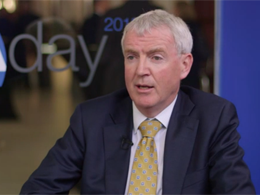
Blockchain Promises Banks A Lot, But Full Benefits Will Be Long-Term
Paul Schaus, CEO at CCG Catalyst, a bank management consulting firm, argues in American Banker that banks’ investments in blockchain technology will come to full fruition in several years due to regulatory uncertainty, but it will provide some benefits short term in improving internal operations. He argues that banks must have realistic and long-term expectations. Schaus noted that an IMB survey of 200 global banks indicated 15% will introduce blockchain-based products next year, and 65% will have them in the next three years. Expectations Must Be Tempered. Banks have to temper....
Related News
A new Morgan Stanley report aimed at assessing whether blockchain is a threat to big banks agues that the short-term benefits of the technology are likely minimal, but that future growth is likely. Published yesterday, the report features a timeline of when Morgan Stanley predicts certain blockchain milestones will be reached. Culminating in 2025, Morgan Stanley identifies 10 roadblocks to banks integrating blockchain. However, the report includes language that suggests the global investment bank may be seeking to understand how blockchain tech may impact its portfolio or perhaps its own....
Banks need to understand blockchain technology and explore its long-term benefits, according to the head of group payments and operations at the Bank of Ireland and chairman of the European Banking Association (EBA) working group. Speaking at EBA 2015, a networking and research event which gathers European payment professionals, Vincent Brennan told Finextra: "We see [the blockchain] as a technology that while relatively novel and new is one that if you look into two years, five years or 10 years, would be very important for banks and now is the time to start understanding it and looking....
In an interview with IBTimes, blockchain specialist Nick Szabo has said that the banks would need to abide by the same principles as are followed by Bitcoin, if they want to get more out of blockchain. For that, he said, the banks will have to accept the system of 'permissionless blockchain.'. He also said that if the banks decided to go on the path of permissionless blockchain then they will not only do as good as the current companies but also may end up surpassing them. However the cryptocurrency specialist was quick to point out that since the bureaucracies are keenly focused on the....
If global central banks are any indicator, the bitcoin price can continue its supersonic bull run despite hitting a pause in the past three weeks.
Bitcoin was designed to be a decentralised peer-to-peer payment protocol and one that would fall outside the control of both governments and banks. This, however, has not prevented central banks from voicing their opinion on the digital currency and its potential regulation. Although bitcoin regulation continues to be a contentious subject, some central banks have said it is necessary. Others have assessed the potential costs of regulation and realised that this would not outweigh the benefits. Additionally, institutions have explored both the risks and benefits associated with the use of....





